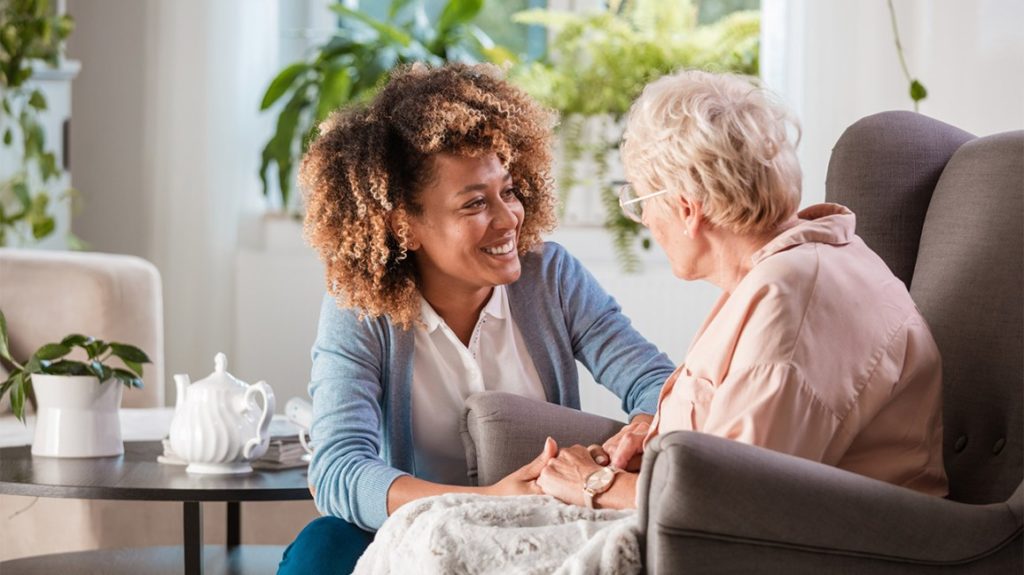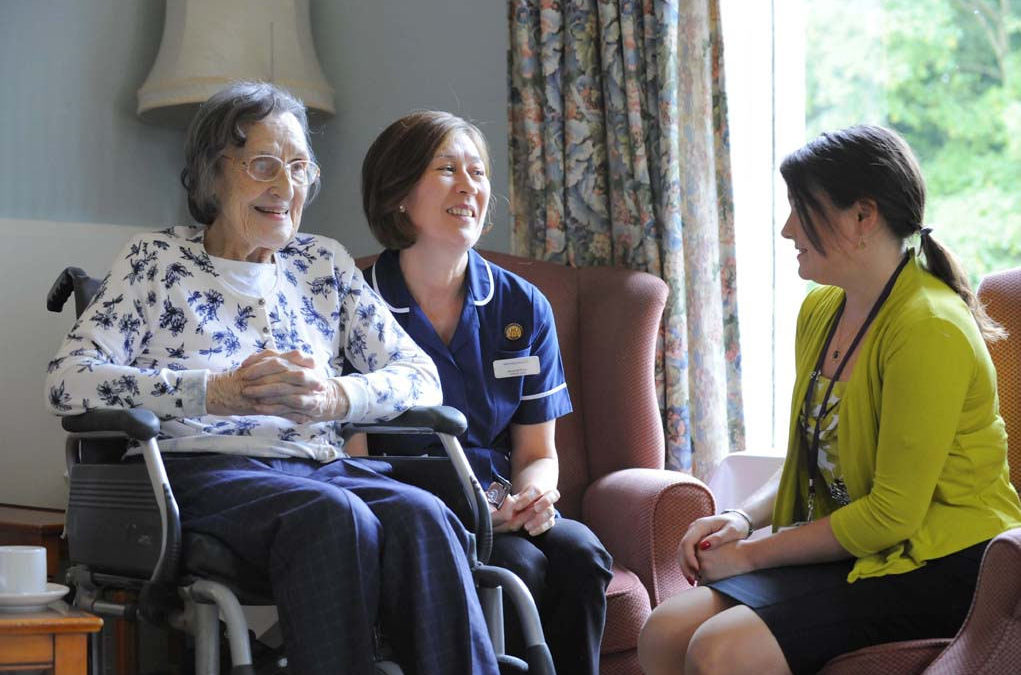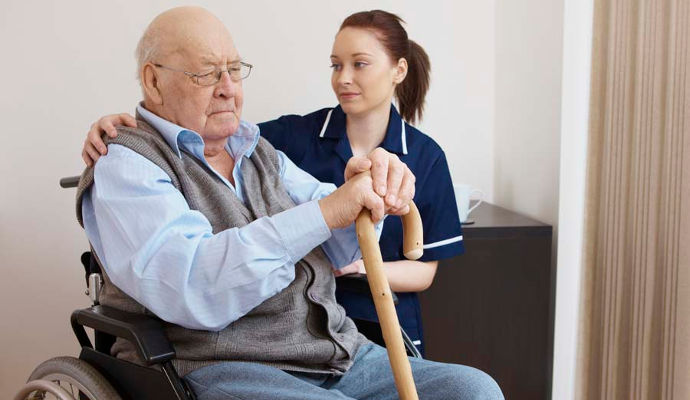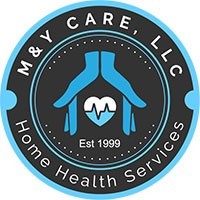
by Vikram Makhija | Dec 14, 2021 | Blog |
If you’re like most people, you appreciate the convenience and simplicity of home health care companies.
These organizations make it easy to get the medical services and assistance you need without having to leave your home.
Home health care companies provide a number of services, including home nursing, physical therapy, and hospice care. They can also help with things like meal preparation, laundry, and light housekeeping.
Thanks to these companies, you can get the help you need while still enjoying all the comforts of home.
Home health care companies provide a number of benefits to their customers. One benefit is convenience.
For example, if you live in an isolated area where it’s hard to find medical services, getting help from home health care companies can be much easier than arranging for transportation and traveling to doctors’ offices or clinics.

Home health care companies also give you the opportunity to receive high-quality yet affordable medical assistance at home, which can be particularly helpful if your condition requires that you receive frequent treatment over an extended period of time.
Home health care companies are committed to providing patients with excellent customer service.
They understand that living at home can make it difficult to schedule appointments or get rides for things like physical therapy sessions, they do their best to accommodate busy schedules and last-minute changes.
The goal of home health care companies is to make it easier than ever for people to receive the medical attention they need while also enjoying all the comforts of home.
Home health care companies provide a number of other benefits. For example, many offer 24/7 live support, so if you find yourself facing an emergency or other serious problem when your caregiver isn’t around, you won’t have to go long without help.
Home health care companies also give families peace of mind by ensuring that their loved ones get all the medical treatment and assistance they require while still remaining in familiar surroundings and among family and friends.
Ultimately, home health care companies make life at home much easier and more comfortable for seniors, elderly people, and people with disabilities.
By providing reliable, high-quality services without requiring their customers to make special arrangements or travel far from home, companies like M&Y Care LLC help people live their lives to the fullest while maintaining all the comforts of home.
For more than 10 years , M&Y Care LLC has proudly offered its members a wide range of medical services which include Alzheimer’s care , Parkinson’s care, end of life care , multiple sclerosis (MS) care , stroke rehab , respiratory therapy and wound care .
In addition, we offer light housekeeping , personal laundry service and meal preparation .
M&Y Care LLC is part of the nation’s largest network of local home health care agencies that has been honored by a U.S. Government Accountability Office (GAO) study as providing some of the best home health care in America.
Last year we served more than 60,000 people and their families across the country and we’re looking forward to continuing these efforts in 2013 and beyond!
M&Y Care LLC is a part of the nation’s largest network of locally based home health care agencies which also has been honored by a recent independent study conducted by an independent healthcare research consulting company as one of the top 20% of home health agencies in the United States for quality-of-care practices!

We’ve been serving individuals with disabilities, senior citizens and people with Medicare throughout our local community since 2006.
While we’re proud of these honors, we take even greater pride in the fact that we’re part of a network of neighborhood-based home health care agencies that provides superior, cost-effective medical assistance to people living at home.
We believe this is especially important because it gives us the ability to offer our clients access to a wide range of medically necessary services without requiring them to make special arrangements or travel long distances from their homes.
Conclusion paragraph
If you’re looking for a way to stay at home while getting the medical services and assistance that can help improve your quality of life, then consider contacting M&Y Care LLC.
We’ll provide all the care you need without having to leave home. Whether it’s nursing or physical therapy, we’ve got what you need! Plus, their staff will do things like meal preparation so there are no worries about where your next meal is coming from.
We know how important living comfortably in your own surroundings is- let us show you just how easy it can be with our team of experts on board doing everything for you! What would it mean to have more time on your hands? Do any of these benefits sound appealing? Contact us today.

by Vikram Makhija | Dec 5, 2021 | Blog |
Making the decision to put a loved one in a senior living facility can be difficult. You may be wondering if it’s the right thing to do, or if there are other options available.
In this post, we’ll explore some of the reasons why you might want to consider a senior living facility for your loved one. Keep in mind that this is not an exhaustive list, and every situation is different. If you have any questions, please don’t hesitate to reach out to us!
What Are Senior Living Facilities?
Before we get into the reasons why you might want to consider them, let’s take a moment to describe what senior living facilities are.
Also referred to as retirement communities, senior housing facilities offer a variety of living arrangements for people over the age of 55.
This can include independent living, assisted living, and even nursing homes. It’s important to note that there is a difference between “senior” housing and “retirement” communities.

Retirement communities typically focus on providing an active lifestyle for older adults who want to stay involved in hobbies or social activities.
In contrast, senior housing facilities tend to be focused on caregiving services such as meals and medications for seniors who may require additional assistance with daily tasks.
What are the Benefits of Senior Living Facilities?
Once you have a better understanding of what senior living facilities are, let’s take a look at some of the benefits. This list is not exhaustive, but here are some common reasons why people choose to put their loved ones in senior housing facilities:
Personal Care
People who have difficulty taking care of personal hygiene may require assistance managing tasks like bathing and dressing. Personal care services provided by senior housing can help improve your loved one’s quality of life.
Staying Safe
Some seniors find themselves more vulnerable to illness or trauma as they age. Having around-the-clock monitoring can keep your loved one safe when you’re not there to watch over them yourself.
Socialization
Loneliness is a common problem for older adults. Socialization opportunities offered by senior housing facilities help promote a sense of community and belonging amongst the residents.
Mental Care
Many seniors benefit greatly from cognitive therapy or memory care designed to improve their ability to think, act, and reason effectively.
There are some similarities between this form of treatment and how children learn, so if your loved one is suffering from dementia or another mental impairment it can be very beneficial.
Dietary Needs
Some seniors have difficulty maintaining their nutritional needs independently after they’ve become older adults. Getting meals delivered on a daily basis helps ensure that your loved one gets the necessary nutrients to maintain good health.
Medical Assistance
Seniors living in living facilities typically receive on-site medical care. This can include physical therapy, social work, or assistance with medication management.

What to Look for in Senior Living Facilities
Now that you have a better understanding of what senior living facilities are, let’s take a look at some of the things that you should consider when looking into them for your loved one.
While there is no “perfect” senior living facility that has it all, they do offer many benefits and advantages over other types of housing arrangements.
Here are some common questions you might want to ask yourself before selecting one:
How Much Does It Cost?
One of the most important things to consider when choosing a senior housing facility is cost . Senior living facilities charge monthly rates which can vary widely depending on how much independent living is included in your loved one’s living arrangements.
What Services are Offered?
It’s important to know what services are offered by senior living facilities before you bring your loved one in to live with you there.
For example, is medical care provided for residents? What about transportation? Meal service? Housekeeping services?
What Types of Residents Live There?
Some senior housing facilities are designed specifically for people who have certain needs or issues that require special attention. It’s important that you find a facility that caters to the specific form of care that would be most beneficial for your loved ones.
How Long Have They Been Around?
When something new comes on the market it tends to make headlines, but when something venerable like a senior living facility has been in business for years it means they’ve built up a good reputation over time. Make sure you go with the best, not necessarily the new kid on the block.
What are Independent Living Senior Apartment Communities? And Why Are They Better Than Traditional Assisted Living Facilities?
Independent living communities are usually made up of small buildings or “villages” that have 4-20 apartments spread throughout them.
The idea behind these types of facilities is to help seniors maintain their sense of independence while still giving them access to some types of medical care and assistance if they need it.
Residents at independent living communities generally have their own apartment which includes basic amenities like appliances, furniture, etc.
They also have access to security services, housekeeping, and other types of assistance that they may need throughout the year.
One thing to note is that many independent living communities do not accept Medicaid or Medicare for payment, so you’ll have to come up with the money on your own.
However, while independent living facilities are great for seniors who want to maintain their independence while still getting some level of assistance, they don’t provide the same level of care as an assisted living facility can offer.
Seniors who live at independent senior apartments usually need only minimal assistance every day, so if someone in your family requires heavy-duty medical care like physical therapy or help with personal hygiene then an assisted living facility would be a better choice (if it can be afforded).
Conclusion paragraph
If you’re thinking about options for your loved one, it’s worth considering the benefits of senior living facilities. We can help answer any questions or concerns that you might have about this process – feel free to reach out!

by Vikram Makhija | Nov 28, 2021 | Blog |
No one wants to think about needing home health care services, but the fact is that sometimes those services are necessary. When it comes time to find a provider for those services, it can be overwhelming to know where to start.
How do you know which company will provide the best care for your loved one? This guide will help make the process easier by outlining what to look for and how to find the right home health care service provider.
Ask Friends and Family
Start by asking friends and family if they know anyone who has used home health care services. Are they happy with the service? Would they use it again? If someone is looking at multiple companies, ask which ones were good and why.
Ask for specific names of people you should ask about each company to ensure that you get reliable information. You can also ask what was not so great about particular services in case your loved one requires something different than the normal routine. This will help you get an idea of what type of provider to seek out based on their needs.

Check Local Providers
Another source of information is local providers in your area that are listed through Medicare or Medicaid . These companies may not be quite as familiar to your friends and family, but they have been screened and meet a certain level of quality.
You can also look for reviews on these providers to get a good sense of what others have thought about their services.
Look for a Provider That Fits Your Needs
When you are looking at home health care service providers, it is important to find one that fits your needs. Are you looking for someone to provide just a little bit of help? Or do you need someone who can take on most of the caregiving responsibilities? Make sure to ask the company what services they offer and see if they match up with what you are looking for.
Check Credentials
It is also important to check the credentials of any home health care service provider before you hire them. Are they licensed in your state? What is their rating with the Better Business Bureau ? Do they have any complaints against them? Ask to see their insurance and workers’ compensation certificates to ensure that you and your loved one are covered in case of an accident.
Get a Quote
Once you have narrowed down your list of potential providers, it is time to get quotes from each of them. This will give you a good sense of what the cost will be for their services. Be sure to ask about hidden fees or additional costs that may not be included in the quote so that there are no surprises down the road.
Interview Potential Providers
Finally, once you have selected a few potential providers, it is time for an interview. There are a few questions that you should ask in order to get a sense of what type of relationship you will have with the provider and how reliable they are likely to be when it comes time to care for your loved one.
What are your rates? Who is responsible for payment? What do I need to supply?
Can you provide references from previous patients or their families so I can talk with them about their experiences? If not, why not?
How often will updates on my loved one’s health status be provided? Who would be responsible for informing me if anything changes in his/her condition/health status while under your care? Do you have an emergency number that can be called 24 hours a day if there is an emergency involving my loved one?
Is a nurse or other medical professional available 24 hours a day, if needed? If not, who is available to answer questions and address concerns during non-business hours? Can I be assured that any complaints I have about your services will be heard and resolved quickly? Who should I contact if I have a complaint at any time while you are providing care to my loved one? How many patients do you typically see each week/month/year?

Asking these types of questions will help you figure out how committed the provider is to taking care of your loved one. You can get an idea of their level of professionalism and expertise as well as what type of rapport you may have them over the course of their care.
Of course, there is much more to learn when it comes to home health care services . To learn more about the types of services you can expect and how to choose the best provider in your area for your loved one’s needs, be sure to check out our free training here .
We also invite you to take a look at our other helpful resources on the site including dozens of articles that are designed to help you better understand all aspects of aging , where you can find local resources , how Medicare works , what benefits are available for your situation and so much more! If you would like additional information about finding the best providers possible, make sure to connect with us on Facebook or through Twitter !
We hope this article has been helpful. Please feel free to share it with your friends and family!
Conclusion paragraph
With this guide, you should now know what to look for when looking into the best home health care service provider.
If you are still unsure about how these services can help your loved one or want more information on where to start with finding a company, please contact us and we will be happy to answer any questions that may have come up during reading this article.
We hope that by following the steps in our guide, making a decision won’t feel so overwhelming!

by Vikram Makhija | Nov 20, 2021 | Blog |
If you’re like most people, you probably think of home health care as only for the elderly or infirm. And while it’s true that those populations often need these services, there are many other reasons to consider them.
In fact, there are a number of reasons why home health care might be a good option for you or someone you love. Here are just a few:
Home health care is more affordable than you may think.
Many people assume that visiting nurses only do the most basic tasks, helping patients with things like bathing or making sure they take their medication on time.
While this kind of care certainly does fall within traditional home health care services, there’s actually much more involved in providing these services than you might imagine (and less involved in taking them away).
For example, these nurses will also check out everything from iron levels to blood sugars . When done regularly this not only ensures that your loved one is staying as healthy as possible, it can also help head off potential health problems down the road.

Home health care is often more convenient than a trip to the doctor’s office.
When you’re not feeling well, the last thing you want to do is travel somewhere. With home health care, your loved one can get the care they need without ever having to leave home.
This is a huge plus for anyone who is elderly or frail, since it means they don’t have to put any extra strain on their bodies. It’s also great for kids who are sick – no need to miss another day of school!
Home health care helps keep families together.
There’s nothing quite like being able to take care of your loved one in the comfort of their own home. When you choose home health care, you’re not only ensuring that they get the best possible care, but you’re also keeping your family close.
This can be incredibly important during difficult times, and can help make sure that everyone stays connected even when things are tough.
Home health care provides peace of mind.
For many people, one of the biggest benefits of home health care is the peace of mind it brings. Knowing that someone is checking in on your loved one regularly – and that they have access to quality medical care should something happen – can be a huge relief. It’s one less thing to worry about, and can really help take the load off in a time of need.
If you’re considering home health care for yourself or a loved one, be sure to check out the many services offered by agencies like Amedisys.
From in-home nursing to physical therapy to hospice care, they have everything you need to make sure your loved one gets the best possible care – all in the comfort of their own home.
It can help reduce hospital readmissions.
As the number of older adults in America continues to rise, hospitals are working harder than ever before to ensure that their patients are discharged quickly and safely. While many patients do wonderfully during their initial hospital stays, some end up returning because they aren’t getting the post-hospital care they need.
When you choose home health services, you’re not only reducing this risk, you’re also freeing up valuable hospital beds for other sick individuals. This helps improve your loved one’s chances significantly while also helping hospitals better serve their communities .
It can help reduce the cost of professional caregiving services.
For some families, the cost of hiring a professional for home health care is simply too much to handle. But even if you can afford it, this doesn’t mean that your loved one will be receiving the right type of care.
Professional home health care services are just that – professional . This means that they aren’t always equipped to deal with certain situations or challenges, regardless of how well trained they are.
By choosing an in-home nurse, you can rest easy knowing that someone who really understands your loved one’s specific needs is there when they need them most.
It allows individuals to receive more personalized attention.
As anyone who has ever worked with a personal assistant can tell you , having someone around to help lighten the load can be one of the most rewarding experiences in life. This is especially true when it comes to caring for an elderly loved one.
When you choose home health care services, you’re allowing your loved one to have more personalized attention without requiring you to hire a full-time nanny .
Instead of having to place them in a facility or pay someone else to take care of everything, you can simply hire the right company and let them handle all of the hard work. This means they’ll feel more supported and unified with their family during some of the toughest moments they’ve ever faced .
It can help save families money on professional caregiving services over time.
While many families might balk at the idea of hiring a nurse to take care of their loved one, the benefits can quickly become clear over time. This is especially true when you choose a home health care service that offers ongoing check-ups and exams .
By having someone with medical training on-hand to monitor your loved one’s vitals, you’ll know if they start to decline before it becomes an issue. This allows you to plan ahead instead of scrambling at the last minute, which helps save money in the long run.

It can improve your loved one’s quality of life.
Above all else, the most important thing to remember is that home health care can improve your loved one’s quality of life in a significant way. From providing them with the emotional support they need to making sure they’re getting the right type of care, everything you do makes a difference.
When it comes time to choose a home health care service, be sure to do your research . Not all services are created equal, and some might be better suited for your specific needs than others. With the right care in place, you can feel confident knowing that your loved one is in good hands – no matter what happens.
It can provide peace of mind for caregivers.
Even when your loved one is in the best hands possible, you’re still going to worry. After all, this is a family member we’re talking about!
But when you choose home health care services for an elderly parent or relative , your peace of mind can remain intact thanks to around-the-clock support and care.
When your loved one has medical training on hand to monitor their vitals and watch out for potential issues, it provides both them and you with an added layer of security.
Instead of scratching your head at 3AM because they aren’t answering the phone, having a nurse there allows you to get the sleep that you need so that everything feels more manageable come morning time .
There are many different types of home health care services available, so there’s sure to be one that meets your needs.
Just as there are many different types of people in the world, there are also many different types of home health care services available. This means that no matter what your needs or budget happen to be, you’re sure to find something that works for you.
From nurses who provide around-the-clock support to aides who can help with simple tasks like bathing and grooming, there’s a service out there that can meet your specific needs. Be sure to do your research before making a decision, as this will help ensure that you’re getting the best possible care for your loved one.
Final thoughts
Choosing home health care services can be one of the best decisions a family caregiver ever makes. By providing your loved one with the support they need, you’re giving them the chance to live their life in the best way possible – no matter what happens.
As we age, our health begins to decline and we often need a little extra help to get through the day. Home health care services can provide that help, whether it’s through around-the-clock support or periodic check-ups. With the right service in place, you can rest assured knowing that your loved one is being taken care of in the best possible way.

by Vikram Makhija | Nov 10, 2021 | Blog |
People are living longer than ever before. In the United States, there are now more than 46 million people aged 65 or older, making up 15 percent of the population. Advances in medical science and technology have contributed to this increase in life expectancy, but with age come new challenges.
One of the most important issues facing seniors today is how to age safely and effectively in their own homes. For many, home health care services provide the necessary assistance and support to do just that.
In this post, we’ll take a look at what home health care services are all about and how they can help you or a loved one stay safe and comfortable at home as you get older. We’ll also discuss some of the common misconceptions about these services and set the record straight.

What Are Home Health Care Services?
Home health care services encompass a wide range of support and assistance that can be tailored to meet the specific needs of each individual client. Generally, home health care providers offer one-on-one care or assistance with various activities of daily living (ADLs), such as bathing, dressing, and grooming. They may also provide medication management, help with mobility, or aid in preparing meals.
Most home health care services are provided in the client’s own home, which allows them to maintain their independence and privacy while getting the support they need. In some cases, however, clients may require more intensive or round-the-clock care and may need to move into a care facility.
Who Needs Home Health Care Services?
Seniors are the most common recipients of home health care services, but the need for these services can arise at any age. Anyone who is unable to fully take care of themselves or who requires assistance with daily activities may benefit from home health care. This includes people who are recovering from an illness or injury, those living with a chronic condition, and those who are nearing the end of their life.
How Much Do Home Health Care Services Cost?
The cost of home health care services will vary depending on the type and intensity of care needed. Generally, however, expect to pay anywhere from $15 to $40 per hour for one-on-one care. More intensive or around-the-clock care that requires the assistance of multiple caregivers will cost more, with some agencies charging $50 to $100 per hour or more.
It’s important to note that Medicare does not cover home health care services unless they are ordered by a doctor as part of your post-hospital recovery. But you may be eligible for other financial assistance programs to help offset costs.
For example, some states offer grants through their Area Agencies on Aging (AAA) that can help pay for certain home health care expenses. You can find your local AAA office at eldercare.gov . Depending on your situation, you may also qualify for Medicaid benefits .
There is also an extensive network of non-profit organizations dedicated to helping seniors and others with financial difficulties pay for home health care services. The best way to find a non-profit that can help you is to visit the website of the National Association of Area Agencies on Aging .
Once there, choose your state from the dropdown menu and click “Go.” This will bring up contact information for your local AAA office, which can provide names and phone numbers of agencies near you that may be able to assist.
Misconceptions About Home Health Care Services
In many cases, seniors are reluctant to seek out home health care services because they believe these services are only necessary when they are in poor health or nearing death. Contrary to this belief, it’s important to remember that seniors need assistance with daily activities at any point in their life, not just in the later years.
Another common misconception is that home health care services are expensive and unaffordable. As we’ve seen, however, the cost of these services can vary depending on the level of care needed. And for those who qualify, there are a number of financial assistance programs available to help pay for home health care.

How Home Health Care Services Can Help You or a Loved One
There are many ways in which home health care services can help you or a loved one stay safe and comfortable at home as you get older. Here are just a few:
- Home health care can provide assistance with daily activities such as bathing, dressing, grooming, which can help seniors stay healthy and independent.
- Home health care can also provide medication management and other health services, which can help seniors stay on track with their treatments and improve their overall health.
- Home health care can help caregivers provide the emotional support and social interaction that is so important for seniors’ mental wellbeing.
- And lastly, home health care can provide peace of mind to both seniors and their loved ones by ensuring that someone is always there to help in case of an emergency.
If you are considering home health care services for yourself or a loved one, it’s important to do your research and find the right agency that fits your needs. The best way to start is by visiting eldercare.gov , where you can find information and referrals for local agencies in your area. And remember: No matter what age you are, it’s never too early to start looking into the kinds of services available to help seniors live more independently at home.
Blog post conclusion paragraph
In this blog post, we’ve looked at how people are living longer and what that means for seniors. We touched on the importance of aging in place safely with home health care services from a professional caregiver to help you stay healthy and happy at home.
If you or someone close to you is dealing with these issues, please contact us today. Our team can provide all-inclusive senior inhome care solutions tailored just for your needs!

by Vikram Makhija | Nov 1, 2021 | Blog |
If you’re a caregiver for a senior, you know it can be challenging. But don’t worry, you’re not alone! Here are some tips to help make your job a bit easier. First, make sure the senior has plenty of activities to keep them busy.
This will help prevent them from feeling bored or restless. Second, make sure their living environment is as comfortable as possible. Third, eat healthy and exercise regularly yourself so you can stay energized and healthy.
Finally, stay positive and patient! Remember that the elderly often have difficulty with mobility and memory, so don’t get frustrated if they forget things or take a long time to do something. With these tips, you can make caring for a senior a little less daunting.

1. Learn to identify signs of dementia. Some common symptoms of dementia are confusion, agitation, anxiety, restlessness, depression, changes in mood or behavior and memory loss.
2. Try to keep the senior’s living environment as comfortable as possible. For instance, ensure they have enough lighting in their home so they do not trip over things at night.
3. Make sure to eat healthy and exercise regularly yourself so you can stay energized and healthy. This is especially important if you’re caring for an elderly parent too!
4. If your senior loves gardening, encourage them to start a garden in their backyard! They’ll love getting fresh air while socializing with friends or neighbors who stop by to help out or give advice on which plants grow best in certain conditions (e.g. full sun, partial shade, etc.).
5. Stay positive and patient! Remember that the elderly often have difficulty with mobility and memory, so don’t get frustrated if they forget things or take a long time to do something. With patience, you can make caring for a senior much easier!
6. Know what to do if the senior falls and is unresponsive. If you notice they have been sitting or lying in the same position for a long time, shake them and ask if they are alright.
Try to get them to respond by asking questions (“What is your name?”, “What day/month/year is it?”, etc.). If you’re unable to get a response from them after several attempts, call 911 immediately.
7. Know what not to do if the senior falls and is unresponsive. Calling their names repeatedly or shaking them roughly will not help! You should also avoid trying to pick up an unresponsive senior yourself as this can make injuries worse, do more harm than good, and could even lead to broken bones.
8. Set reminders on your phone of when medicines need to be taken, appointments need to be made, or when the senior needs to eat. This will help you stay organized and less stressed.

9. Get involved with a support group for caregivers. This is a great way to share your experiences and advice with others who are in a similar situation as you. You can also find out about helpful resources and programs in your area.
10. Take breaks! If you’re feeling overwhelmed, take some time for yourself. Go for a walk, watch your favorite movie, or just relax in a quiet room. Knowing you have some time to yourself will help rejuvenate you so you can continue caring for the senior.
11. Educate yourself on how to handle a seizure in a senior. If it’s necessary to wake the senior up, do so gently. Gently shake them and call their name until they respond. When the seizure is over, help them safely return to a laying position if they are standing or sitting upright.
12. Pick up all loose items in the home, especially small objects like coins or jewelry, that could cause trips or falls if left out.
13. Make sure furniture (especially chairs) cannot be pulled into stairs by positioning them flush against wall or placing a chair under front legs of furniture.
14. Replace handheld showerheads with mounted models for seniors who still enjoy taking showers; also install non-slip rubber strips or decals on floor of tub/shower for safety .
15. If possible, move the senior’s bed to the ground floor of their home if they are having difficulty with stairs.
16. Assist the senior in choosing clothing that is easy to put on and take off (e.g. pants with elastic waistbands, shirts with buttons instead of zippers, etc.).
17. Take them out for walks and social activities as often as possible to keep them mentally and physically stimulated.
18. If the senior has a pet, make sure they are taken care of and well-fed while you’re caring for the senior. This can provide some relief for you and give the pet some much-needed attention!
19. Make a list of emergency numbers (including 911) and keep it near the phone or in a convenient spot. This will help you if there is an emergency and you need to get help quickly.
20. Ask the senior’s doctor if they can provide any resources or tips on how to care for them. They may have specific instructions on things like wound care, administering medication, or helping with mobility.
21. Take inventory of all the supplies you will need to care for the senior and make a shopping list so that you’re prepared when needed (e.g. medical supplies, personal hygiene products, snacks, etc.).
22. Don’t be afraid to ask for help! Friends, family members, neighbors, or church groups may be willing to pitch in and give you a break every once in a while.
23. Understand when it is time for hospice care. Hospice at Home can help you care for a terminally ill family member in the comfort of their own home.
24. Keep your sense of humor! If things get too stressful, take a minute to watch a funny video or tell a joke with the senior. Laughter is good medicine!
25. Find out about different types of memory loss and what they mean. This will help you understand what the senior is experiencing and how to best communicate with them.
26. Take care of yourself, too! It’s important to make sure you’re getting enough rest, eating healthy foods, and exercising regularly. This will help you stay strong so you can continue caring for the senior.
27. Seek professional help if you are feeling overwhelmed or stressed out. There are many resources available to caregivers, and it’s important to get the support you need.
28. Document everything! This includes daily routines, medications taken, meals eaten, conversations had, etc. This information can be helpful if there are any changes in the senior’s condition down the road.
29. If possible, attend a caregiver support group where you can share experiences and learn valuable information.
30. Call for help if the senior’s condition suddenly worsens (e.g. increased confusion, bleeding that won’t stop, etc.). If needed, take them to their doctor or the emergency room right away.
31. Help seniors who are losing mobility by cleaning up clutter in their home which could make it difficult to maneuver around; also consider adding handrails in high traffic areas like hallways and staircases .
32. Have patience! Caregiving is a long-term commitment; it isn’t always easy but your efforts will really make a difference in your loved one’s life!

33. Try not to take things personally talking with the senior about medical conditions, changes in behavior, etc. can be difficult but it’s important that they are able to express what they are feeling.
34. Identify several “safe zones” which are high traffic areas of the house where the senior can escape if they need a break from too much activity (e.g. den, living room sofa, etc.).
35. Keep their normal routine as much as possible! Sticking to your regular schedule will help reduce confusion and agitation for you and the senior .
36. Be prepared for emotional outbursts caused by memory loss or medical conditions; stay calm and remember that this is not their fault .
37. Encourage physical activity by walking with them around the neighborhood or taking them on errands; this will help keep them healthy and mobile.
38. Assist with simple tasks like bathing, dressing, and grooming to make them feel more independent.
39. Make time for yourself! Take a break every day to do something that you enjoy, even if it’s just for a few minutes.
40. Celebrate the small accomplishments! If the senior manages to take a shower on their own or remembers your birthday, celebrate it! These moments are cause for celebration.
Conclusion paragraph
If you’re a caregiver for an elderly person, it can be difficult. But don’t worry! Here are some tips to help make your job easier and more rewarding. First, provide plenty of activities to keep them busy so they don’t get bored or restless.
Second, create the most comfortable living environment possible by making sure their home is clean and clutter-free. Third, stay energized and healthy yourself by eating well and exercising regularly.
Finally, remember that the senior will appreciate all you do for them even if things seem tough at times because caring for someone else sometimes means doing what’s best not only for the other person but also yourself as well!



















